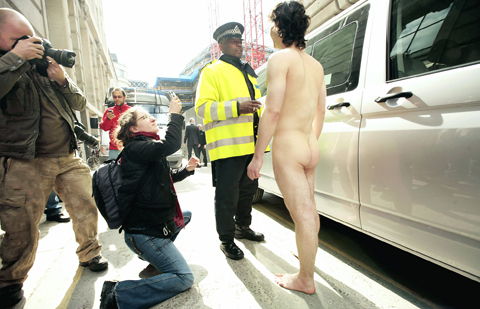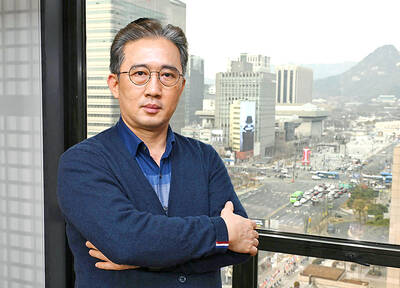Police said yesterday they made 86 arrests during the lengthy violent protests that besieged central London’s financial district ahead of the G20 summit.
Thousands of people demonstrated on the streets of London on Wednesday in angry demonstrations that descended into violent battles with riot police and saw one man collapse and die.
Protesters were set to take to the streets again yesterday, this time close to the ExCeL exhibition center in east London’s Docklands, where the summit was taking place.

PHOTO: AFP
Some protesters smashed their way into the offices of the state-owned Royal Bank of Scotland (RBS) next to the Bank of England on Wednesday, breaking through windows, hurling out office equipment and trying to set it ablaze.
The 86 arrests were for a range of offenses, including violent disorder, aggravated burglary, arson, bomb threats and possession of ammunition.
Four people have been charged with offenses so far, three with possessing a bladed weapon and one with assault.
Police said that about 4,000 protesters had converged on the City of London financial district.
Riot police penned in the protesters and let them out one by one. Some were still being dispersed early yesterday, more than 12 hours after the demonstration began.
Expecting demonstrations and disorder, police launched a massive security operation to keep protesters at bay.
Up to 4,700 police officers, including public order teams, intelligence gatherers and diplomatic security specialists were to be on duty yesterday in the British capital.
The London Stock Exchange opened without incident despite threats from protesters. Police officers circled the entrance to the building.
On Wednesday, riot police staged baton charges to try to disperse several hundred people protesting against a financial system they said had robbed the poor to benefit the rich. At one stage, about 4,000 protesters had thronged outside the central bank.
Rescued by the government in October, RBS and former boss Fred Goodwin, who controversially refused to give up a pension of £700,000 (US$1 million), became lightning rods for public anger in the UK over banker excess blamed for the financial crisis.
During the protests one man died after he collapsed and stopped breathing. Police said they tried to resuscitate him but that they came under a hail of bottles. The man was taken by ambulance to a nearby hospital where he was pronounced dead.
A police source said it was likely the man died from a medical condition but that a post-mortem was needed.
The protests in London’s City financial area coincided with a G20 meeting of the world’s leading and emerging economies.
Protesters hurled paint bombs and bottles, chanting: “Our streets! Our banks!”
RBS said in a statement it was “aware of the violence” outside its branch and “had already taken the precautionary step” of closing central City branches.
As dusk fell, police charged a hard core of anti-capitalist demonstrators in an attempt to disperse them before nightfall. Bottles flew through the air towards police lines and police on horseback stood by ready to intervene.
Some protesters set fire to an effigy of a banker hanging from a lamp post.
Police brought out dogs as they tried to channel the few hundred remaining protesters through the narrow streets surrounding the classical, stone-clad Bank of England.
Some shops had boarded up their windows in case of violence. A Gucci store near the Bank of England was closed and had emptied its windows.
During Wednesday’s protests, demonstrators marched behind models of the “four horsemen of the apocalypse” representing financial crimes, war, climate change and homelessness.
Some threw eggs at police and chanted, “Build a bonfire, put the bankers on the top.” Others shouted “Jump” and “Shame on you” at financial sector workers watching the march from office block windows.
“I am angry at the hubris of the government, the hubris of the bankers,” said Jean Noble, a 60-year-old from Blackburn in northern England. “I am here on behalf of the poor, those who are not going to now get their pension or who have lost their houses while these fat cats keep their bonuses, hide their money in tax havens and go and live where nobody can touch them.”

VAGUE: The criteria of the amnesty remain unclear, but it would cover political violence from 1999 to today, and those convicted of murder or drug trafficking would not qualify Venezuelan Acting President Delcy Rodriguez on Friday announced an amnesty bill that could lead to the release of hundreds of prisoners, including opposition leaders, journalists and human rights activists detained for political reasons. The measure had long been sought by the US-backed opposition. It is the latest concession Rodriguez has made since taking the reins of the country on Jan. 3 after the brazen seizure of then-Venezuelan president Nicolas Maduro. Rodriguez told a gathering of justices, magistrates, ministers, military brass and other government leaders that the ruling party-controlled Venezuelan National Assembly would take up the bill with urgency. Rodriguez also announced the shutdown

Chinese President Xi Jinping’s (習近平) purge of his most senior general is driven by his effort to both secure “total control” of his military and root out corruption, US Ambassador to China David Perdue said told Bloomberg Television yesterday. The probe into Zhang Youxia (張又俠), Xi’s second-in-command, announced over the weekend, is a “major development,” Perdue said, citing the family connections the vice chair of China’s apex military commission has with Xi. Chinese authorities said Zhang was being investigated for suspected serious discipline and law violations, without disclosing further details. “I take him at his word that there’s a corruption effort under

China executed 11 people linked to Myanmar criminal gangs, including “key members” of telecom scam operations, state media reported yesterday, as Beijing toughens its response to the sprawling, transnational industry. Fraud compounds where scammers lure Internet users into fake romantic relationships and cryptocurrency investments have flourished across Southeast Asia, including in Myanmar. Initially largely targeting Chinese speakers, the criminal groups behind the compounds have expanded operations into multiple languages to steal from victims around the world. Those conducting the scams are sometimes willing con artists, and other times trafficked foreign nationals forced to work. In the past few years, Beijing has stepped up cooperation

The dramatic US operation that deposed Venezuelan president Nicolas Maduro this month might have left North Korean leader Kim Jong-un feeling he was also vulnerable to “decapitation,” a former Pyongyang envoy to Havana said. Lee Il-kyu — who served as Pyongyang’s political counselor in Cuba from 2019 until 2023 — said that Washington’s lightning extraction in Caracas was a worst-case scenario for his former boss. “Kim must have felt that a so-called decapitation operation is actually possible,” said Lee, who now works for a state-backed think tank in Seoul. North Korea’s leadership has long accused Washington of seeking to remove it from power